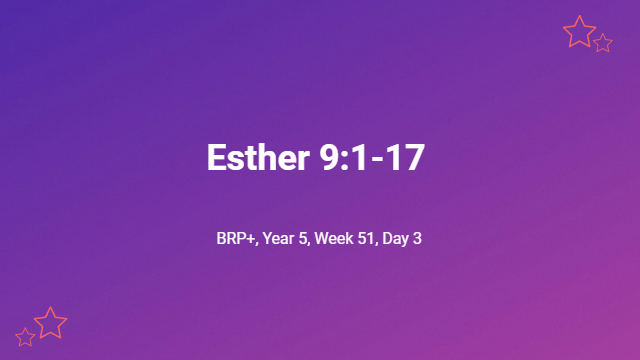Esther 9:1-17
Q.1. Why did the king not simply annul Haman’s edict? How did this prove to be an advantage to the Jews? How was Mordecai regarded? – (Esth.9:1-4 c.f. Esth.1:19; 8:8)
We encounter the irrevocable nature of the Medo-Persian law in the book of Daniel – … sign the document so that it may not be changed according to the law of the Medes and Persians which may not be revoked (Dan.6:8 c.f. Dan.8:12,15). However, a cancellation of the decree would have simply stopped the purge of Jews. The counter-decree that was framed, actually allowed the Jews to treat their enemies with a similar purge and overturn their persecution at the hands of their enemies – … on the day when the enemies of the Jews hoped to gain the mastery over them, it was turned to the contrary so that the Jews themselves gained the mastery over those who hated them (Esth.9:1 c.f. 8:8-11). The ruling class now feared Mordecai – Indeed, Mordecai was great in the king’s house, and his fame spread throughout all the provinces; for the man Mordecai became greater and greater (Esth.9:4 c.f. Esth.9:3). This had happened because Mordecai had been loyal to the king but refused to worship anyone but God alone.
Q.2. How thorough was the destruction of the enemies of the Jews? What further concession was granted to Esther by the king? What made the 14th day special? – (Esth.9:5-17)
The record of the vengeance on the enemies of the Jews is in contrast to Christ’s teaching. Jesus taught us – 43 “You have heard that it was said, `You shall love your neighbour and hate your enemy.’ 44 But I say to you, love your enemies and pray for those who persecute you (Mt.43-44). In the Old Testament, God’s command for Israel to extend special love to her own people had been interpreted by the scribes and Pharisees as hating their enemies (Lev.19:18 c.f. Prov.25:21-22). However, in the context of the day where godless king’s ruled supreme, and life was often cheap, Ahasuerus happily granted an extension of the bloody rampage – 11 On that day the number of those who were killed at the citadel in Susa was reported to the king. 12 The king said to Queen Esther, “The Jews have killed and destroyed five hundred men and the ten sons of Haman at the citadel in Susa. … (Esth.9:11-12). Esther asked that the defence of her people be extended, so – 16 the rest of the Jews who were in the king’s provinces assembled, to defend their lives and rid themselves of their enemies and kill 75,000 of those who hated them; but they did not lay their hands on the plunder. 17 This was done on the thirteenth day of the month Adar … (Esth.9:16-17). The extra day became a special ‘Sabbath’ day – … and on the fourteenth day they rested and made it a day of feasting and rejoicing (Est.9:17). That dreaded day of their extermination was turned into a day of relief and celebration.

